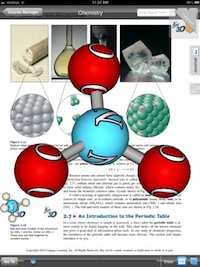Kno Adds Khan Academy Resources to E-Textbooks for iPad

Kno Textbooks for iPad 1.6.1 adds support for zooming and rotating 3D objects. |
E-textbook developer Kno has released Textbooks 1.6.1 for iPad, bringing new multimedia resources to the textbook reader, including videos from Khan Academy, and adding new support for interactive 3D objects.
Textbooks for iPad offers access to a catalog of 100,000 college- and university-level electronic textbooks from major textbook publishers, including Cengage Learning and McGraw-Hill Higher Education, among others. The app offers a range of enhanced mobile learning tools for working with textbooks, including a course manager that lets students organize textbooks and other learning materials in a central location, social networking tools that connect students via Facebook and Twitter, highlighting, sticky notes, chapter previews, and support for downloading and reading PDFs from the Web.
The latest release of Textbooks for iPad, version 1.6.1, includes a new beta feature called Smart Links, which brings contextually related external multimedia resources into textbooks accessed through the reader in order to help make material more accessible to students. These include instructional videos from the popular education resource provider Khan Academy.
"Khan Academy's goal is to provide a free world-class education to anyone, anywhere," said Salman Khan, founder and executive director of Khan Academy, in a statement released today. "We're excited that Kno sees the value in our mission and has integrated our videos and study tools directly into their books. This provides students with a new way to access Khan Academy content--and all within the context of what they are already learning."
Kno reported that the feature will eventually be available in all of its more than 100,000 textbooks.
The new version also adds beta support for interactive 3D objects. The feature allows students to manipulate 3D objects with zoom and 360 degrees of rotation. 3D object support is available initially only for chemistry textbooks.
Other new features include screen capture (for grabbing stills of notes and whiteboard sessions) and the ability to record videos of lectures. Screen captures can be added to users' journals, while video captures can be incorporated into their notes.
Kno's Textbooks 1.6.1 is available as a free app for iPad with support for English, Vietnamese, Chinese, Korean, Japanese, French, German, Dutch, and Basque. It can be found in the iTunes Store.